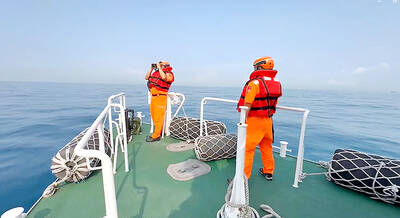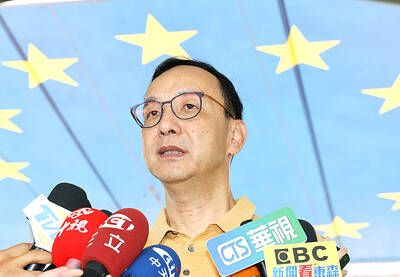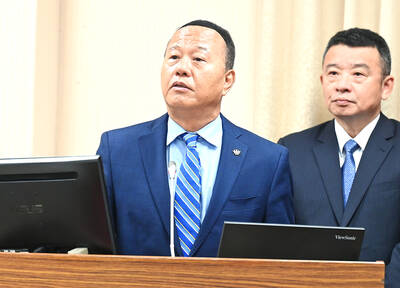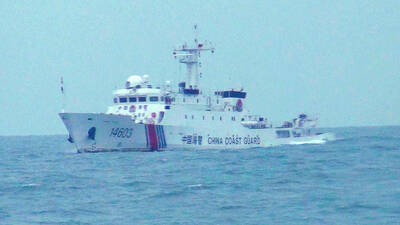The Chinese Nationalist Party (KMT) yesterday revoked former Executive Yuan secretary-general Lin Yi-shih’s (林益世) party membership, saying he had damaged the KMT’s reputation following his arrest over corruption allegations.
“The KMT nurtured Lin and gave him important roles in the past, but his behavior has seriously damaged the party’s reputation. Although Lin has expressed regret and is willing to leave the KMT, the Evaluation and Discipline Committee decided to revoke his membership in accordance with party regulations,” the KMT said in a statement.
Chuang Po-chung (莊伯仲), director of the KMT’s culture and communication committee, said that Lin’s case was under investigation and the party respected the judicial mechanism and expected the investigation to uncover the truth.
Lin, 44, a member of a clique of officails who enjoyed President Ma Ying-jeou’s (馬英九) trust, is suspected of accepting a bribe two years ago and demanding a bribe this year.
He is believed to be a Ma appointee, who was given the post of Cabinet secretary-general after losing his bid for re-election as a legislator in January. Following Lin’s downfall, critics said Ma should yield all decisionmaking power over Cabinet appointments to Premier Sean Chen (陳冲).
The Presidential Office yesterday dismissed the accusations that Lin was appointed under Ma’s influence.
“Top-level Cabinet officials are nominated by the premier and approved by the president, according to the Constitution. In practice, the president and the premier decide on the nominees together after discussion ... President Ma has always respected the premier’s authority to pick Cabinet members,” Presidential Office vice spokesperson Lee Chia-fei (李佳霏) said.
Ma and Chen discussed the candidates for Executive Yuan secretary-general during the Cabinet reshuffle in February and agreed that Lin, who is familiar with legislative affairs as a former director general of the KMT’s policy committee, should be able to help negotiate with the legislative branch on behalf of the Cabinet, she said.
The president said on Monday it was extremely regrettable that a member of his administration has been involved in such a case and said the government should learn its lesson and be more cautious in personnel appointments.
“President Ma’s statement on Monday is a public apology, and when he talked about the administration being more cautious in personnel arrangement, he meant both the Presidential Office and the Executive Yuan. President Ma himself is of course a member of the administration,” Lee said.

An increase in Taiwanese boats using China-made automatic identification systems (AIS) could confuse coast guards patrolling waters off Taiwan’s southwest coast and become a loophole in the national security system, sources familiar with the matter said yesterday. Taiwan ADIZ, a Facebook page created by enthusiasts who monitor Chinese military activities in airspace and waters off Taiwan’s southwest coast, on Saturday identified what seemed to be a Chinese cargo container ship near Penghu County. The Coast Guard Administration went to the location after receiving the tip and found that it was a Taiwanese yacht, which had a Chinese AIS installed. Similar instances had also

GOOD DIPLOMACY: The KMT has maintained close contact with representative offices in Taiwan and had extended an invitation to Russia as well, the KMT said The Chinese Nationalist Party (KMT) would “appropriately handle” the fallout from an invitation it had extended to Russia’s representative to Taipei to attend its international banquet last month, KMT Chairman Eric Chu (朱立倫) said yesterday. US and EU representatives in Taiwan boycotted the event, and only later agreed to attend after the KMT rescinded its invitation to the Russian representative. The KMT has maintained long-term close contact with all representative offices and embassies in Taiwan, and had extended the invitation as a practice of good diplomacy, Chu said. “Some EU countries have expressed their opinions of Russia, and the KMT respects that,” he

VIGILANCE: The military is paying close attention to actions that might damage peace and stability in the region, the deputy minister of national defense said The People’s Republic of China (PRC) might consider initiating a hack on Taiwanese networks on May 20, the day of the inauguration ceremony of president-elect William Lai (賴清德), sources familiar with cross-strait issues said. While US Secretary of State Anthony Blinken’s statement of the US expectation “that all sides will conduct themselves with restraint and prudence in the period ahead” would prevent military actions by China, Beijing could still try to sabotage Taiwan’s inauguration ceremony, the source said. China might gain access to the video screens outside of the Presidential Office Building and display embarrassing messages from Beijing, such as congratulating Lai

Four China Coast Guard ships briefly sailed through prohibited waters near Kinmen County, Taipei said, urging Beijing to stop actions that endanger navigation safety. The Chinese ships entered waters south of Kinmen, 5km from the Chinese city of Xiamen, at about 3:30pm on Monday, the Coast Guard Administration said in a statement later the same day. The ships “sailed out of our prohibited and restricted waters” about an hour later, the agency said, urging Beijing to immediately stop “behavior that endangers navigation safety.” Ministry of National Defense spokesman Sun Li-fang (孫立方) yesterday told reporters that Taiwan would boost support to the Coast Guard